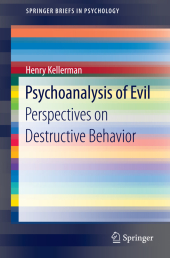 Neuerscheinungen 2014Stand: 2020-02-01 |
Schnellsuche
ISBN/Stichwort/Autor
|
Herderstraße 10
10625 Berlin
Tel.: 030 315 714 16
Fax 030 315 714 14
info@buchspektrum.de |

Henry Kellerman
Psychoanalysis of Evil
Perspectives on Destructive Behavior
2014. 2014. xxi, 153 S. 235 mm
Verlag/Jahr: SPRINGER, BERLIN; SPRINGER INTERNATIONAL PUBLISHING 2014
ISBN: 3-319-07391-5 (3319073915)
Neue ISBN: 978-3-319-07391-0 (9783319073910)
Preis und Lieferzeit: Bitte klicken
For all our knowledge of psychopathology and sociopathology--and despite endless examinations of abuse and torture, mass murder and genocide--we still don´t have a real handle on why evil exists, where it derives from, or why it is so ubiquitous.
A compelling synthesis of diverse schools of thought, Psychoanalysis of Evil identifies the mental infrastructure of evil and deciphers its path from vile intent to malignant deeds. Evil is defined as manufactured in the psyche: the acting out of repressed wishes stemming from a toxic mix of harmful early experiences such as abuse and neglect, profound anger, negative personality factors, and mechanisms such as projection. This analysis brings startling clarity to seemingly familiar territory, that is, persons and events widely perceived as evil. Strongly implied in this far-reaching understanding is a call for more accurate forms of intervention and prevention as the author:
Reviews representations of evil from theological, philosophical, and psychoanalytic sources.
Locates the construction of evil in psychodynamic aspects of the psyche.
Translates vague abstractions of evil into recognizable concepts.
Exemplifies this theory with the lives and atrocities of Hitler and Stalin.
Applies psychoanalytic perspective to the genocides in Turkey, Pakistan, Cambodia, and Rwanda.
Revisits Hannah Arendt´s concept of "the banality of evil."
Psychoanalysis of Evil holds a unique position in the literature and will gather considerable interest among readers in social psychology, psychoanalysis, sociology, and political anthropology. Historians of mass conflict should find it instructive as well.
Part I: Evil: Discussion I - The Garden.- Entering the domain of evil.- The nature of the Serpent in Paradise: Who or what is the Serpent?.- Theological references to evil.- Philosophical references to evil.- Psychoanalytic references to evil.- Part II: Discussion II - Individuals and Societies.- Hitler and genocide.- Stalin and genocide.- Turkey´s genocide against Armenians.- Sample of other 20th century genocides: Bangladeshi, Cambodian and Rwandan.
Henry Kellerman, Ph.D. is a psychologist/psychoanalyst/author. His career has spanned more than 50 years doing work as an interpreter of personality. Having held staff positions and professorial appointments at several hospitals and universities, he is also author and editor of 29 books and many scientific and clinical papers published in professional journals. Dr. Kellerman is a Diplomate in Clinical Psychology and in Psychoanalysis of the American Board of Professional Psychology. He is in private practice in New York City.


